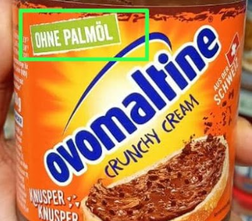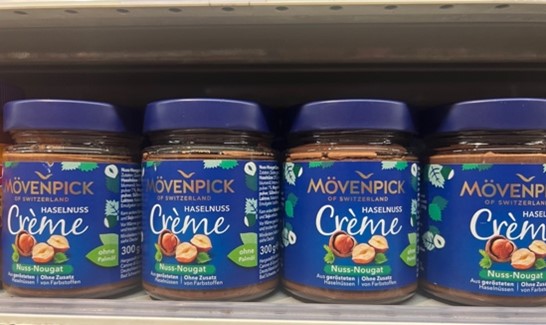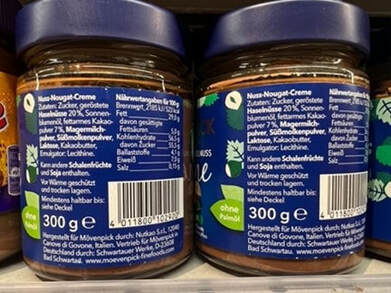Palm Oil Free Products in Malaysia
Update March 22, 2023
The end of palm oil free labels in Europe
The only palm oil free labels that may survive this proposal, maybe those that can prove, the consumer product they endorsed, is better for the environment overall.
Today, the Commission is proposing common criteria against greenwashing and misleading environmental claims. Under today's proposal, consumers will have more clarity, stronger reassurance that when something is sold as green, it actually is green, and better quality information to choose environment-friendly products and services.
The end of palm oil free labels in Europe
The only palm oil free labels that may survive this proposal, maybe those that can prove, the consumer product they endorsed, is better for the environment overall.
Today, the Commission is proposing common criteria against greenwashing and misleading environmental claims. Under today's proposal, consumers will have more clarity, stronger reassurance that when something is sold as green, it actually is green, and better quality information to choose environment-friendly products and services.

Update November 18, 2022
Confectionery News Report: ‘Chocolate is eating West African forests’ - new data casts doubt on cocoa traceability
Report concludes that traceability for cocoa is poor compared to palm oil from Indonesia. If brands like Ovomaltine want to make dubious eco-claims like "Ohne Palmol" they should be prepared to prove that the cocoa used, is not driving deforestation in Africa.
Confectionery News
Confectionery News Report: ‘Chocolate is eating West African forests’ - new data casts doubt on cocoa traceability
Report concludes that traceability for cocoa is poor compared to palm oil from Indonesia. If brands like Ovomaltine want to make dubious eco-claims like "Ohne Palmol" they should be prepared to prove that the cocoa used, is not driving deforestation in Africa.
Confectionery News
Original Commentary below
- There has been concern over the sale of products that display a “palm oil free” label in Malaysia.
- These products have been exclusively Western-owned brand products that have been imported into Malaysia.
- Reuters reported in 2019 that:
One of Malaysia’s largest supermarket chains, Mydin, banned the sale of any products that used anti-palm oil marketing in its labels to send a message that palm oil is important to Malaysia.
The Malaysian cabinet took swift action and approved a proposal in the following month, to ban labels that were considered to be anti-palm oil. This quick approval was expected as “no palm oil” or “palm oil free” labels in Europe had long been considered by Malaysia and Indonesia as an affront to the sustainable development these premier palm oil producing countries.
The Malaysian cabinet took swift action and approved a proposal in the following month, to ban labels that were considered to be anti-palm oil. This quick approval was expected as “no palm oil” or “palm oil free” labels in Europe had long been considered by Malaysia and Indonesia as an affront to the sustainable development these premier palm oil producing countries.
From a recent market investigation, The Malaysian Palm Oil Council (MPOC) found that checks conducted on 251 retail outlets, 80 outlets were found to carry labels that claimed to be “Palm Oil-Free” or “Does Not Contain Palm Oil”. This is a clear violation of the regulations governing truth in labeling requirements in Malaysia and carries the risk of legal action by the consumer affairs ministry.
The threat of legal action has already reduced the number of retail products with palm oil free labels since 2019. In its latest press release, the CEO of MPOC, Mdm Wan Aishah, repeated that the penalties for breaking the law on labeling information is a hefty fine or jail time.
Considering the legal consequences of selling products with a "No Palm Oil" label in Malaysia, one has to question why some retailers continue to do so. Some of these products were imported from European manufacturers, which is surprising considering the legal precedents set by Nutella in Europe.
In a widely publicized court case, a Belgian court awarded the decision to Nutella, which had sued Delhaize for deceptive advertising by adding the words “palm oil free” in promoting Delhaize’s Choco product.
“The court sustained Ferrero’s arguments that it is illegal to claim that a product without palm oil is de facto better for environment and has better nutritional qualities than one containing palm oil”
Palm Oil Free Labels a Competitive Marketing Edge in Europe?
So why are European food manufacturers breaking the law by adding “palm oil free” to their labels?
Global Fats and Oils wrote an in-depth report on the matter in 2020, explaining that food businesses fear they may lose a competitive edge if they do not use palm oil free marketing gimmicks.
The ‘palm oil-free’ claim is illegal and in violation of EU law, notably of the Food Information Regulation (FIR) and the Nutrition and Health Claims Regulation, which are directly applicable in all member-states. However, the Regulations are not always properly enforced by the authorities.
What information we have on the palm oil free labeled products being sold in Malaysia indicates that the same claims, which violate both European and Malaysian laws on labeling information, may also be in violation of membership pledges made to the Roundtable On Sustainable Palm Oil (RSPO)
The RSPO position on “No Palm Oil” marketing claims read pretty much like what EU and Malaysian lawmakers have said about truth in labels.
“RSPO revised its Rules on Market Communications & Claims (the Rules) in 2015 and members had until 1 September 2016 to comply with these new rules. The revision included how RSPO should respond to negative ‘No Palm Oil’ product claims made by members.
The new Rules outline that it is now mandatory for RSPO members to “avoid negative claims and seek to promote the aims and goals of RSPO”. A Negative Claim is defined by the RSPO as any claim which “conflicts with the stated aims of the RSPO and/or implies that the removal of palm oil from a product is a preferable social or environmental sustainability outcome to the use of Certified Sustainable Palm Oil (CSPO)”.
Based on the findings of the latest survey of products in Malaysia’s retail sector, members of the RSPO including Nestle (which produces the Movenpick brand), are in violation of the RSPO rules as evidenced by the labels below.
The threat of legal action has already reduced the number of retail products with palm oil free labels since 2019. In its latest press release, the CEO of MPOC, Mdm Wan Aishah, repeated that the penalties for breaking the law on labeling information is a hefty fine or jail time.
Considering the legal consequences of selling products with a "No Palm Oil" label in Malaysia, one has to question why some retailers continue to do so. Some of these products were imported from European manufacturers, which is surprising considering the legal precedents set by Nutella in Europe.
In a widely publicized court case, a Belgian court awarded the decision to Nutella, which had sued Delhaize for deceptive advertising by adding the words “palm oil free” in promoting Delhaize’s Choco product.
“The court sustained Ferrero’s arguments that it is illegal to claim that a product without palm oil is de facto better for environment and has better nutritional qualities than one containing palm oil”
Palm Oil Free Labels a Competitive Marketing Edge in Europe?
So why are European food manufacturers breaking the law by adding “palm oil free” to their labels?
Global Fats and Oils wrote an in-depth report on the matter in 2020, explaining that food businesses fear they may lose a competitive edge if they do not use palm oil free marketing gimmicks.
The ‘palm oil-free’ claim is illegal and in violation of EU law, notably of the Food Information Regulation (FIR) and the Nutrition and Health Claims Regulation, which are directly applicable in all member-states. However, the Regulations are not always properly enforced by the authorities.
What information we have on the palm oil free labeled products being sold in Malaysia indicates that the same claims, which violate both European and Malaysian laws on labeling information, may also be in violation of membership pledges made to the Roundtable On Sustainable Palm Oil (RSPO)
The RSPO position on “No Palm Oil” marketing claims read pretty much like what EU and Malaysian lawmakers have said about truth in labels.
“RSPO revised its Rules on Market Communications & Claims (the Rules) in 2015 and members had until 1 September 2016 to comply with these new rules. The revision included how RSPO should respond to negative ‘No Palm Oil’ product claims made by members.
The new Rules outline that it is now mandatory for RSPO members to “avoid negative claims and seek to promote the aims and goals of RSPO”. A Negative Claim is defined by the RSPO as any claim which “conflicts with the stated aims of the RSPO and/or implies that the removal of palm oil from a product is a preferable social or environmental sustainability outcome to the use of Certified Sustainable Palm Oil (CSPO)”.
Based on the findings of the latest survey of products in Malaysia’s retail sector, members of the RSPO including Nestle (which produces the Movenpick brand), are in violation of the RSPO rules as evidenced by the labels below.
Why Are Western brands showing Palm Oil Free Labels in Malaysia?
Considering the strong reactions by Malaysia towards palm oil free labeling in Europe and the fact that they are illegal in both producer and importer countries, it is therefore surprising to hear that multiple imported products bearing No Palm Oil labels have been found for sale in Malaysia.
Were these food companies hoping to appeal to an anti-palm oil consumer in Malaysia the same way that they’ve risked illegal activities in Europe to keep market share?
Buying expensive imported foods, requires a consumer market with a higher GDP. Palm oil as a key export revenue earner, has contributed immeasurably to the GDP of Malaysia where her citizens are now able to afford imported processed foods such as those being produced by Movenpick and Ovolmaltine.
Continue reading about No Palm Oil labels in Malaysia
Published October 2022
Considering the strong reactions by Malaysia towards palm oil free labeling in Europe and the fact that they are illegal in both producer and importer countries, it is therefore surprising to hear that multiple imported products bearing No Palm Oil labels have been found for sale in Malaysia.
Were these food companies hoping to appeal to an anti-palm oil consumer in Malaysia the same way that they’ve risked illegal activities in Europe to keep market share?
Buying expensive imported foods, requires a consumer market with a higher GDP. Palm oil as a key export revenue earner, has contributed immeasurably to the GDP of Malaysia where her citizens are now able to afford imported processed foods such as those being produced by Movenpick and Ovolmaltine.
Continue reading about No Palm Oil labels in Malaysia
Published October 2022
|
|
|


